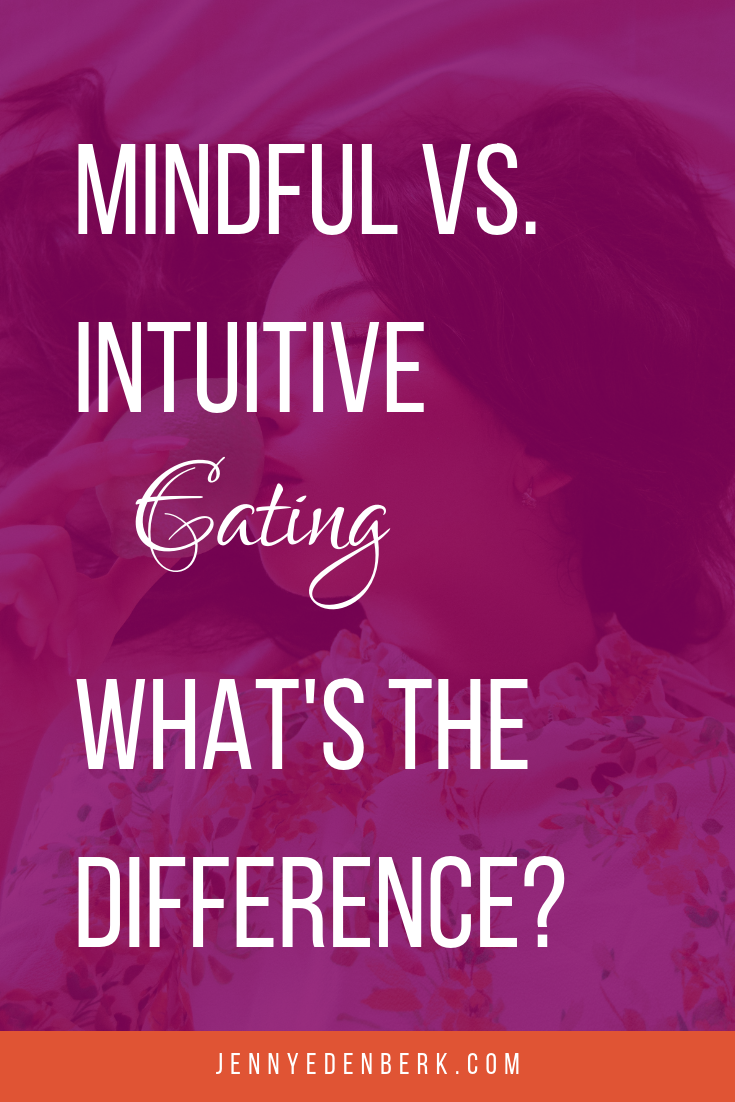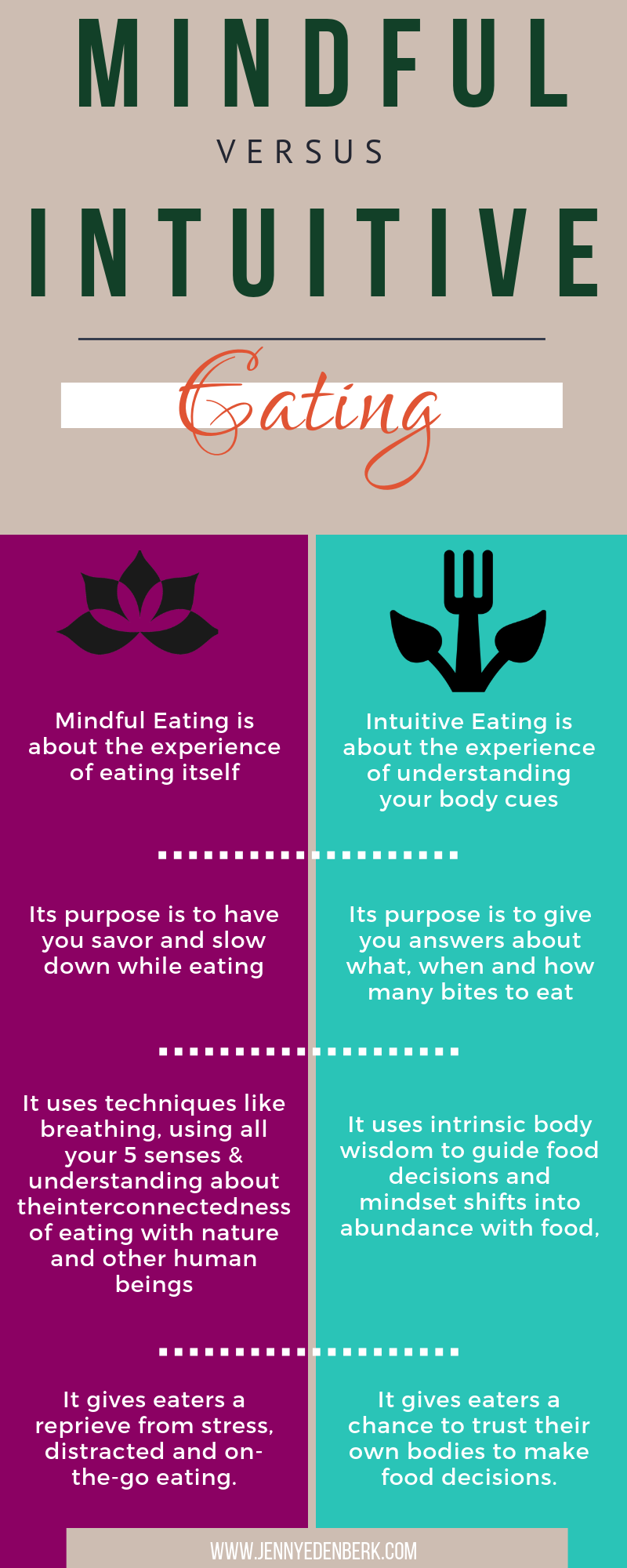Mindful vs. Intuitive Eating: What's the Difference?
I get asked this question a lot, so I thought I’d devote a whole blog post to it!
At the bottom, I’ve created a ::ahem:: shareable infographic for you to share your newfound knowledge with others! Win-win.
Ok, So let’s talk about Mindful Eating first.
Mindful Eating:
Mindful eating is about conscious awareness of the eating experience itself and its affect on our emotions, physiology, mindset, behaviors and psychology.
But it’s much more than that:
It’s also about being mindful and aware of the interconnectedness between ourselves, the environment and the universe itself.
It’s also about understanding and appreciating the journey that food takes to get to your plate, and all the people and systems involved to get that food to you.
It’s about understanding, moment-by-moment, how your body is experiencing the meal and listening to the subtle cues it gives you as to when to stop eating or when your taste buds have become saturated.
And it’s about recognizing that when we eat in a distracted or stressful (fast, chaotic, standing up, while driving, etc.) way we inadvertently set up challenges for our bodies to give us the proper satiety cues.
Because we often hold judgements and conflicted feelings both about what we’re eating and how much, it can obfuscate one of the most important parts of mindful eating - experiencing PLEASURE.
So, when I talk about becoming a more mindful eater in general, what I’m talking about is the eating experience itself - the flavors, the smells, the recall of memories, feelings or beliefs that are attached to that food. And it’s also about the circumstances surrounding how you eat.
For instance, I had one client I worked with on Mindful Eating for six months. The first time she sat down to a mindful meal, alone and without any distractions, she became very anxious. She felt compelled to turn on the TV and to eat really quickly. When I asked her about the experience in one of our sessions, she told me she realized that her childhood family dinner was often very stressful and chaotic: the TV was always on in the background, there was always someone arguing and if you didn’t eat fast, someone would grab the last chicken wing or even grab food off of her own plate.
If that is what had become familiar and commonplace for this client, you can see just how incredibly weird, unsafe and stressful it might be for her to sit and eat slowly in silence. She had become so accustomed to eating fast (for survival) and to the atmosphere being so frenetic and chaotic in the household at dinner time, that being relaxed while eating seemed unfathomable or certainly something she wouldn’t allow herself to experience. Once she became aware of this connection and was able to practice a new behavior, we were able to work through it. In fact, she now finds eating incredibly pleasurable and prefers to eat alone!
>> Click here to apply for one of my mindful eating 1:1 coaching packages
Intuitive Eating
Intuitive eating, much like mindful eating is about being in flow. It’s about respecting and honoring internal cues from the body to determine what and how much to eat versus external factors such as the clock or what the rules are of a particular diet plan.
Unlike Mindful Eating, however, which is about the eating experience itself, Intuitive Eating is more about trusting the body’s intuition to make important decisions about food. An intuitive eater learns to understand why he or she might be craving a particular food. An intuitive eater has lunch whenever he or she wants instead of always at noon because noon is lunchtime.
An intuitive eater doesn’t obsess about portion sizes because she or he trusts that the body will naturally guide her or him to what and how much it needs, (with practice of course).
Intuitive Eating is also more about empowering oneself to be his or her own inner dietician rather than about the mechanics of slowing down during the meal. (Intuitive eaters may already eat slowly and mindfully).
Let me outline this again for you citing a case study.
I worked with Paul S. for almost a year. He was a chronic yo-yo dieter who felt very motivated by the scale and My Fitness Pal and all the structure and rules of certain programs. He felt safe joining these aggressive weight loss programs because it gave him accountability and rules to adhere to because he didn’t trust himself. The problem was that these rules were driving him nuts and catapulted him into an inexorable, soul-shattering loop of “white knuckling” and “willpowering” his hunger away, and then eventually binging, gaining weight and starting the cycle again.
He knew he wanted to change this, but had trouble loosening his grip on certain food rules he created for himself, like not eating anything after 6pm, ever. But, then predictably, he’d find himself eating cereal at 9pm and then beating himself up for it.
In this case, I worked with him on abundance mindset. So many years of clinging to food rules left him completely afraid of letting go for fear of instant weight gain and misery. So intuitive eating in this situation meant learning to trust himself around any food and giving him permission to eat whatever he pleased for two weeks, without judgement. For the first few days he did binge. He ate all the ice cream and pizza and chips and burgers and cookies that he had been denying himself on and off for two decades. Then something interesting happened. He looked at the Oreos on the shelf one day, shrugged his shoulders and told himself he’d eat it later if he wanted. Without the “rules” and the fear of some sort of immediate punishment for breaking those arbitrary rules, he set himself free.
None of these practices happen quickly, nor are they a quick fix for anything. This is exactly that, a practice - something you get better at, enjoy more with time and find continuous information, substance, guidance and insight into your own eating preferences and style. You get to craft and design your own individualized relationship with food. Mindful and intuitive eating can help remove the external noise around you so you deepen the mind/body connection and get to your own answers quicker but more importantly forever - not just for the hot minute you got motivated with in one day.
Check out this handy, dandy infographic I made to help you easily distinguish between Mindful and Intuitive Eating - basically the Cliff notes version of this article. Enjoy!

